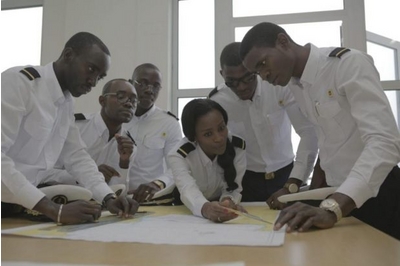A SCOTTISH college is helping to transform the economy of an African country ravaged by civil war for nearly a quarter of a century.
City of Glasgow College has entered into partnership with some of the world’s largest multinational companies under an initiative to train Angolans for careers in the maritime industry.
Officials from the Glasgow college have helped create the new £110 million training facility high on a cliff overlooking the Atlantic Ocean near the village of Sumbe, some 350km south from the capital of Luanda.
Staff from Glasgow have also developed the curriculum and are now teaching the first batch of students at the Centro de Formacao Maritima de Angola.
The centre, which is equipped with state-of-the-art equipment, a library, IT suite with wifi and residential accommodation, will train students for a number of careers in the industry from ship’s captains to engineers, navigators and deck hands.
All will spend the second year of their course in Glasgow.
Underpinning the project is the aim to provide skilled Angolans to work in the shipping industry, which is helping to extract and export the country’s vast offshore oil reserves.
One of the first students to benefit from the six-year initiative, driven and financed by multinational shipping company Stena and Angola’s state oil company Sonangol, is 21-year-old Jisilda Nguli from Benguela.
Talented at school, the deck cadet secured a scholarship from Sonangol to join the programme and now dreams of becoming a ship’s captain.
“This is a big opportunity for me to have a career,” she said. “People think this is something that only men can succeed in, but I want to show them that girls can do it just as well.
“I am looking forward very much to coming to Glasgow next year to finish my studies, although people have told me it is very cold.”
Antonoio Tabita, 26, comes from a poor rural background close to the town of Soyo, north west of the capital, and lived in a mud house with his eight brothers when he was growing up. “I am from a poor family, but I got a scholarship and now I have a big opportunity to make a successful career,” said the deck cadet.
“I was good at science at school and so it seemed like the right career. This centre is the best place to get the qualifications I need because it is of such high quality. It is also very good for Angola, because we do not have enough people who are skilled in this area.
“I never thought we would have such a good centre here, but things are changing.”
Another student to benefit is engineering cadet Jaco Tiberio, 20, from Luanda. “This is a new career here, and when I became aware of the centre I wanted to join,” he said. “I liked mechanical engineering and I thought I could make a success here. I want to become a chief engineer and have a good career, which is now possible.”
Speaking at the launch of the new centre in Angola this week, Paul Little, principal of City of Glasgow College, said the venture proved Scottish colleges could export training across the globe in the same way Scotland’s universities now operate.
He said: “Scotland has a reputation for delivering world-class education and we are proud to have world renowned centres of excellence in nautical studies training some of the best ships captains and officers.
“In an increasingly globalised world we believe it is important to share our expertise and skills, and the centre in Angola is a fantastic example of that in action. We are advancing the reputation of Scottish colleges across the globe and also making a positive difference in developing countries.”
Head of Centre Captain John Lloyd added: “We have created some of the best maritime training facilities in the world here in Angola. We look forward to it becoming the long-term training provider of choice for all operators in Angola.”
Kevin Slade, director of Northern Marine Management Ltd, part of the Stena Group, said the group would maintain strong links with international institutions including City of Glasgow College “to ensure that the centre receives the support necessary for the continued delivery of the highest standards of training.”




